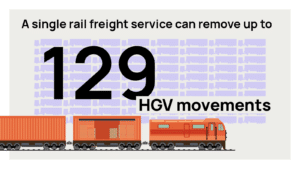Rail freight could contribute almost double its economic value by 2050, new research finds
News - March 23, 2023
Research published by Rail Partners, the trade body representing five of the UK’s biggest rail freight companies, earlier this month, outlines the economic and environmental achievements of the rail freight industry so far and the heights it could reach by 2050 with further policy support from UK government. This week, John Smith attended a Rail Partners parliamentary reception to present the Freight Expectation report to, Rail Minister, Huw Merriman and a group of MPs and Lords.
When comparing rail and road freight, rail freight already has a number of advantages.

With each freight train taking up to 129 heavy goods vehicles (HGVs) off the road, rail freight plays a key role in reducing the congestion on our roads. This easing of our road networks strengthens the county’s net zero efforts, with the typical freight service producing 76% less CO2 per tonne than the equivalent movement by road, the research finds.
At a time when the UK is searching to speed up economic growth, the sector plays another important role by contributing £2.45bn in economic value annually. With 90% of this value reaching areas outside of London and the Southeast, this bolstering of the economy also goes along way to bolstering the UK’s Levelling Up ambitions.
However, the research shows the industry could have more to contribute to the UK’s strategic objectives if the Government were to aim to treble rail freight by 2050. This ambition would see the sector contribute almost £5.2bn to the UK economy, whilst removing the need for over 20 million HGV journeys per year.
John Smith, GB Railfreight CEO, said: “Rail freight has long been the backbone of the UK’s economy. Over recent years our industry has grown and adapted in the face of global challenges. We’ve demonstrated the ambition and resilience needed to futureproof the UK logistics sector.
“With our industry already leading the push to decarbonise supply chains, thanks to innovations like our hybrid Class 99 locomotives, this research illustrates how much further rail freight can go in shaping robust climate friendly supply chains and business operations. For our industry to reach the more sustainable vision outlined in this report, a real commitment and long-term investment from the UK government is needed.”


 Introduction
Introduction







